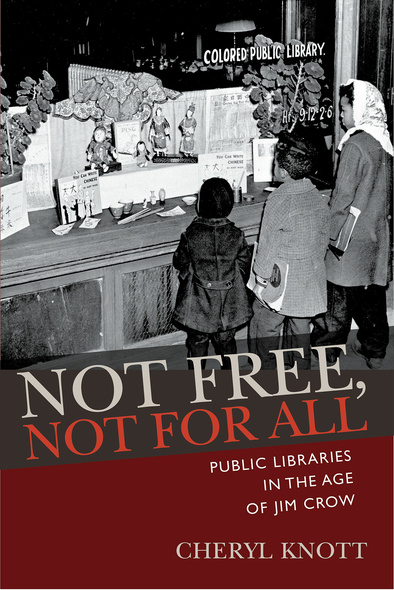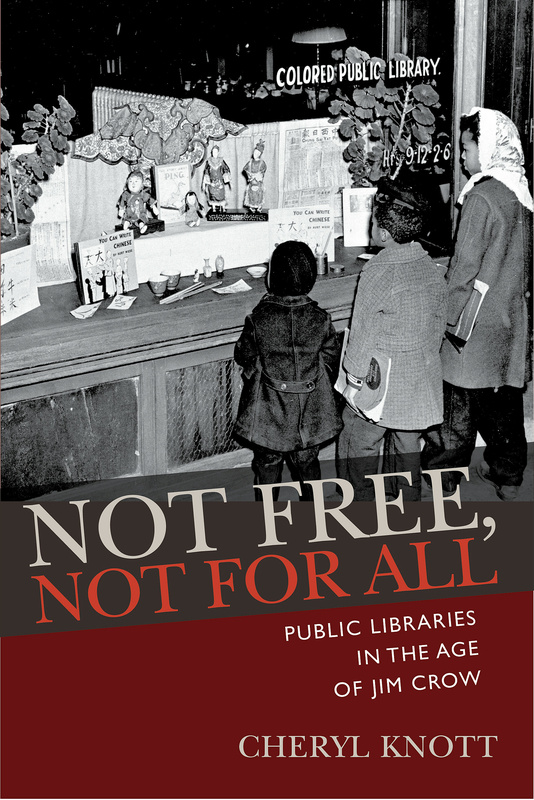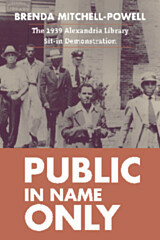Our shopping cart is currently down. To place an order, please contact our distributor, UTP Distribution, directly at utpbooks@utpress.utoronto.ca.
Not Free, Not for All
Public Libraries in the Age of Jim Crow
By Cheryl Knott
University of Massachusetts Press
Winner of the 2016 Eliza Atkins Gleason Book Award and the 2016 Lillian Smith Book Award
Americans tend to imagine their public libraries as time-honored advocates of equitable access to information for all. Through much of the twentieth century, however, many black Americans were denied access to public libraries or allowed admittance only to separate and smaller buildings and collections. While scholars have examined and continue to uncover the history of school segregation, there has been much less research published on the segregation of public libraries in the Jim Crow South. In fact, much of the writing on public library history has failed to note these racial exclusions.
In Not Free, Not for All, Cheryl Knott traces the establishment, growth, and eventual demise of separate public libraries for African Americans in the South, disrupting the popular image of the American public library as historically welcoming readers from all walks of life. Using institutional records, contemporaneous newspaper and magazine articles, and other primary sources together with scholarly work in the fields of print culture and civil rights history, Knott reconstructs a complex story involving both animosity and cooperation among whites and blacks who valued what libraries had to offer. African American library advocates, staff, and users emerge as the creators of their own separate collections and services with both symbolic and material importance, even as they worked toward dismantling those very institutions during the era of desegregation.
Americans tend to imagine their public libraries as time-honored advocates of equitable access to information for all. Through much of the twentieth century, however, many black Americans were denied access to public libraries or allowed admittance only to separate and smaller buildings and collections. While scholars have examined and continue to uncover the history of school segregation, there has been much less research published on the segregation of public libraries in the Jim Crow South. In fact, much of the writing on public library history has failed to note these racial exclusions.
In Not Free, Not for All, Cheryl Knott traces the establishment, growth, and eventual demise of separate public libraries for African Americans in the South, disrupting the popular image of the American public library as historically welcoming readers from all walks of life. Using institutional records, contemporaneous newspaper and magazine articles, and other primary sources together with scholarly work in the fields of print culture and civil rights history, Knott reconstructs a complex story involving both animosity and cooperation among whites and blacks who valued what libraries had to offer. African American library advocates, staff, and users emerge as the creators of their own separate collections and services with both symbolic and material importance, even as they worked toward dismantling those very institutions during the era of desegregation.
This is a crucial revision in the way we have thought of the history of public libraries in the U.S. This book will influence scholars in a variety of fields as it offers valuable insights on a range of questions about African Americans and their relationship to print culture, and about the ways that we think about the history of segregation and the pursuit of civil rights in this country.'—Elizabeth McHenry, author of Forgotten Readers: Recovering the Lost History of African American Literary Societies
'Beyond the stories of institutional exclusion, Knott's key contribution resides in African American resistance and persistent aspirations toward valuing libraries as essential to their citizenship. . . . An unusually strong and much needed social history critique of the public library's 'free to all' myth, . . . this book is essential.'—Library and Information History
'Not Free, Not for All is an important reinterpretation of public-library collections and services for African Americans in the South during the Jim Crow era. . . . By recasting public libraries as public institutions that used tax-supported funding to prolong white supremacy, this research has implications on information policies, intellectual freedom, and educational inequities resonant in the social, political, and cultural barriers that persist with today's digital divide.'—Choice
'In Not Free, Not for All, Cheryl Knott . . . delivers an illuminating account of the development and demise of separate public libraries for African Americans in the South during the era of segregation.'—The Journal of American Culture
'She unquestionably nuances further how African Americanists in particular have conventionally been socialized to interpret the Jim Crow era. The smallest details that she presents provoke thought.'—The American Historical Review
Cheryl Knott is associate professor in the School of Information at the University of Arizona, Tucson.






